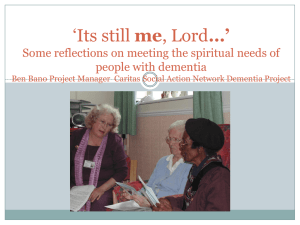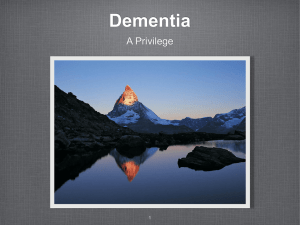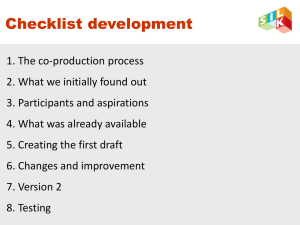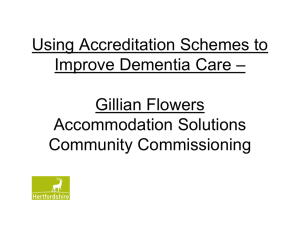Hertfordshire`s Dementia Strategy
advertisement
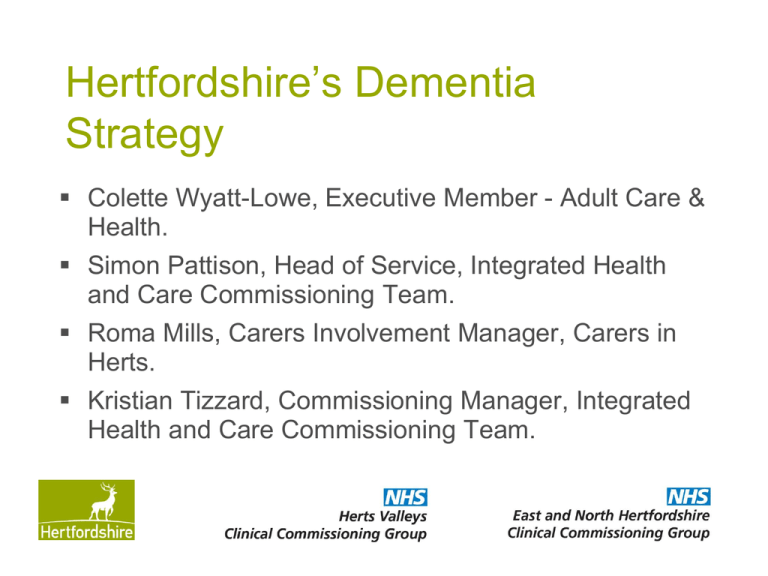
Hertfordshire’s Dementia Strategy Colette Wyatt-Lowe, Executive Member - Adult Care & Health. Simon Pattison, Head of Service, Integrated Health and Care Commissioning Team. Roma Mills, Carers Involvement Manager, Carers in Herts. Kristian Tizzard, Commissioning Manager, Integrated Health and Care Commissioning Team. Summary What is Dementia and who does it affect? What is Hertfordshire doing about Dementia? What is like to be a person with Dementia? How does Dementia affect carers? The 2015-19 Dementia Strategy and “having your say”. Questions. What is Dementia? "Dementia is like brain failure. It describes a syndrome: a series of signs and symptoms, including changes to memory, emotional state and ability to manage”. (Professor Alastair Burns) Common causes include Alzheimer's Disease and vascular dementia. Dementia is progressive and there is currently no cure. Dementia is often treatable. It is possible to live well with Dementia. Dementia affects huge numbers of people. 835,000 people in the UK have Dementia. 21 million people have a close friend or family member with Dementia. £26 billion a year (£4bn NHS, £10bn social care, £12bn unpaid carers). Over 40,000 younger people (65 years of age or below) with Dementia. An estimated13,792 people in Hertfordshire with Dementia in 2014 rising to 15,403 by 2021. What is Hertfordshire doing about Dementia? A strategic priority since 2009. Over £90m spent every year on services for people with Dementia. Specialist services to diagnose and support people with Dementia. Specialist support to leave hospital. Better information available to people with Dementia. What is Hertfordshire doing about Dementia? Improving the quality of care home provision for people with dementia. Improving support for carers of people with dementia. Working towards Dementia Friendly communities: Tring now recognised as a ‘Dementia Friendly Community’ Students at the Grove Junior School, Harpenden becoming Dementia Friends “Singing for the Brain” (the Alzheimer’s Society) Dementia Friends clubs, Dementia cafes, and Young Onset Dementia Activity Groups What can it like to be a person with Dementia? (national picture) Only 58% are “living well”. Less than half of people feel a part of their community. 40% of people felt lonely recently. Almost 10% only leave the house once a month. 72% living with another medical condition or disability as well as dementia. (Dementia 2014: An Opportunity for Change, The Alzheimer’s Society) What is it like to be a person with Dementia in Hertfordshire? Less than half of people with dementia have been diagnosed. The Alzheimer's Society asked 106 people about the support that they received following diagnosis in Hertfordshire: “I was diagnosed early” 66% “I understand, so I make good decisions and provide for future decision making” 46% “I get treatment and support which are best for my dementia, and my life”. 71% What is it like to be a person with Dementia in Hertfordshire? (2) Those around me and looking after me are well supported”. 74% “I am treated with dignity and respect”.79% “I know what I can do to help myself and who else can help me”.67% “I can enjoy life”. 69% “I feel part of a community and I'm inspired to give something back” 46% “I am confident my end of life wishes will be respected. I can expect a good death”. 65% How does Dementia affect carers? Jim • Loss of friends • Loss of job • Loss of income • Isolation • Guilt Sue • Silos – no joined up thinking!!! • A focus on elderly care and support • Impact on children within the family How does Dementia affect carers? Bill Peggy • Reluctant to tell people • Isolated - couldn’t leave my husband • Frightened of what would happen next • He didn’t sleep at night. • Felt abused • Exhausted • Did not know where to go for help • Depressed What carers are asking for ……… • Reliable support at home with staff trained in dementia care • Consistent support – a named worker • Personalised social activities, short breaks (respite care) and day services • Peer support networks and mentors • Flexible ‘sitting services’ including evenings and weekends What carers are asking for ……….. • Easy access to Night Sitters • Collaborative working between services, Wheelchair – Continence – Dietician • Diverse services that meet the needs of the different people affected by dementia – younger people, those with learning disabilities and older people – and their families. • Affordable services What else could make a difference? • Information and support for carers to enable them to understand the condition, to learn techniques for managing stress, diverting anxiety and communicating effectively with the person they care for • Outreach services that respond quickly and provide hospital at home support/assessment • Easy access to clinicians – specialist dementia nurses in the community What if home is no longer the right place? • Robust Dementia care accreditation standards • Regular support from a multi-disciplinary team, including psychologists, therapists, dieticians • Programme of activities • Regular monitoring • Sufficient capacity to allow people to live near their family • Relatives/carers groups The 2015-2019 Hertfordshire Dementia Strategy: quality of life outcomes • I have personal choice and control or influence over decisions about me • I know that services are designed around me and my needs • I have support that helps me live my life • I have the knowledge and know-how to get what I need • I live in an enabling and supportive environment where I feel valued and understood • I have a sense of belonging and of being a valued part of family, community and civic life • I know there is research going on which delivers a better life for me now and hope for the future. (National Dementia Declaration for England (2010). The 2015-2019 Hertfordshire Dementia Strategy Themes Our work will focus on 6 key areas, each supported by an action plan that will be finalised following our engagement with our stakeholders: 1.Promoting health and wellbeing. 2.Developing dementia friendly communities. 3.Enabling equal access to diagnosis and support. 4.Supporting carers of people with dementia. 5.Preventing and responding to crisis. 6.Evidence based commissioning. Promoting health and wellbeing. “What is good for your heart is good for your head”. Successfully encouraging healthy behaviours. Reducing the risk of dementia across the whole population by reducing vascular risk factors. Delivering on Hertfordshire’s Public Health Strategy and ensuring that our commissioning and enables selfmanagement of personal health and wellbeing. Developing dementia friendly communities. Building on the work that is already underway to develop dementia friendly communities by actively encouraging and supporting all partners and communities to commit to becoming dementia friendly. Possible approaches include the commissioning of Dementia Friendly Community Co-ordinators. Ensuring that commissioned health and care services adopt standards that lead to dementia friendly services. Putting dementia quality standards into practice, ensuring that physical environments are dementia friendly (including at home) and that ensuring that professionals who work with people with dementia are well trained. Enabling equal access to diagnosis and support. We will aim to diagnose 75 % of our prevalent population by 2017. Equal care for to people with protected characteristics, such as younger people and people with learning disabilities. “Staying in touch” with people to approach to prevent social isolation and crisis (especially those who live alone). Access to personalised support through and individual health or social care budgets. Access to dementia friendly information, advice and advocacy. Access to dementia friendly technology. Access to person centred respite.. Access to good quality residential/nursing care. Help with planning of care, including around future loss of mental capacity. Access to good quality, dementia friendly End of Life care. Supporting carers of people with dementia. Delivering on our Joint Carers Strategy by supporting carers of people with dementia to: Work if they want to. Have a life outside caring. Stay fit and healthy and be safe. Access full benefits entitlements. Get good quality information when they need it. Feel respected as carers, as partners in care. Young carers should be able to achieve their full potential in education. We will undertake targeted work to understand and improve experience of young carers. We are considering models of support for carers including around managing the more difficult behavioural aspects of caring for a person with dementia. Preventing and responding to crisis. We know that proactive support for people with dementia is important to prevent crisis (Mental Health Crisis Concordat). Continued focus on preventing unnecessary hospital admission and delayed discharge Addressing support around the complex behavioural/ psychological symptoms of dementia , including for people cared for by unpaid carers and for those in care homes. Evidence based commissioning. It is important to commission services using local evidence, evidence based models of care This will involve: Developing our approach in line with good practice in dementia commissioning. Involving people with dementia and their carers in service design and delivery. Developing our Joint Strategic Needs Assessment and improving our understanding of local dementia issues. Making the best use of demographic indictors of health risk to respond where our communities face an increased risk of dementia. Considering evidence around the prevention of dementia and developing our models in response. How do I “have my say”? If would like to have your say on the Strategy, please visit: https://consult.hertsdirect.org/dementiastrategy/ We are at consultation until 31st December 2014.






